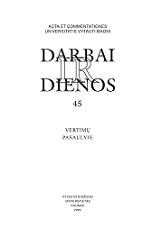Konceptualioji metafora vertime
Conceptual metaphor in translation
Author(s): Rūta MarcinkevičienėSubject(s): Language and Literature Studies
Published by: Vytauto Didžiojo Universitetas
Keywords: Conceptual; metaphor; translation;
Summary/Abstract: Collocations of thought with a verb viewed from a multilingual perspective, using the translation of one novel into five languages as the basis for the pilot study, demonstrated a variety of ways to render collocational patterns and lexicogrammatical meanings. It can be stated that the original collocational patterns are preserved to a different extent in translations, which reveal systemic means to verbalise the notion of thought. The general meaning of initiation (as in the case of inchoative verbs of appearance) and duration (verbs of motion) of actions and processes of thought combined with the syntactic function of the noun thought is preserved in the translations. Lexical meanings of metaphoric verbs and nouns collocating with thought, as rendered in the translations, range from the more universal to language specific and comprise intermediate cases within the scale. Part of these metaphors (in our case personification of thought with the help of verbs of motion, some metaphors from nominal and prepositional phrases) are rendered by similar metaphors in translation while metaphoricity of others (metaphors denoting the occurance, existance and possesion of thought and the nominal metaphor train of thoughts) is not preserved. The very possibility of rendering metaphors from one language into another allows to talk about language universal and specific metaphors.
Journal: Darbai ir dienos
- Issue Year: 2006
- Issue No: 45
- Page Range: 109-118
- Page Count: 10
- Language: Lithuanian

